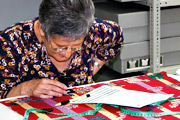Instagram Challenge – Art Inspired by Maya Textiles
This virtual exhibition (click here to view) is the outcome of Friends of the Ixchel Museum first “Call for Artists:Instagram Challenge” (2023). Global artists from Guatemala, Chile, Mexico, Switzerland, the UK, the United States, Colombia, Argentina, the Netherlands, France, Nicaragua, and Pakistan submitted their art pieces influenced and inspired by the Maya textile heritage.
Themes explored in the submissions encompassed a wide spectrum, ranging from pure aesthetics inspired by the colors, motifs, and patterns of Maya textiles to visual narratives depicting personal experiences, social issues, and historical memories associated with the Maya Diaspora.
The artworks showcased an array of techniques and mediums, including handweaving, oil and acrylic paintings, gold leaf, ostrich eggs, digital media, mixed media, natural dyes, sculptures, street art, quilt, body painting, and more.
The diversity and quality of the body of artwork underlines the enduring influence of the Maya textile heritage, transcending its traditional medium of fabric to become an inspirational force for artists worldwide.
Click here to view the virtual exhibition.
Education
Educating a wide variety of interested parties such as weavers, anthropologists, and Latin-Americanists, about Mayan textiles is a shared goal of the FOIM and the Museo. Our FOIM work is diverse—from putting on exhibits in the US, to publishing Bulletin articles, to subsidizing the translation of museum monographs, catalogues and DVDs into English in order to reach a broader public. We support textile research efforts via the library, collection photography, and sponsored fieldwork including on-site photography of vanishing trajes and traditions.
How to wear traje
Many of us are not sure how to actually wear the huipiles, cortes, or tocados. Here’s a video that might help. If you come across others, please share with us.
Textile Conservation
 The Museum’s collection is stored in a controlled environment to obviate damage caused by light, relative humidity, contamination, pests, etc. Its curatorial efforts have received worldwide recognition and led to several important grants. Thanks to sponsorships by organizations such as the John Paul Getty Foundation, the Government of Finland, and the Carene Foundation, the collection is identified and administered using a specially-designed program which records the characteristics of each piece. Systematic documentation and storage allows this heritage to be both conserved and also enjoyed via exhibitions. Significant donations and selective purchases continue to enhance the collection.
The Museum’s collection is stored in a controlled environment to obviate damage caused by light, relative humidity, contamination, pests, etc. Its curatorial efforts have received worldwide recognition and led to several important grants. Thanks to sponsorships by organizations such as the John Paul Getty Foundation, the Government of Finland, and the Carene Foundation, the collection is identified and administered using a specially-designed program which records the characteristics of each piece. Systematic documentation and storage allows this heritage to be both conserved and also enjoyed via exhibitions. Significant donations and selective purchases continue to enhance the collection.
Use the Bulletin Archive on this website to read further conservation information in the June 2011 bulletin.
The Friends also maintain a small collection of textiles in the US which are used for local exhibits, lectures, and workshops. Contact us if you want to plan an exhibit or event; and we also welcome your donations.
Guided Tours and Workshops
The Museum has a Welcome room with introductory videos, as well as printed gallery guides in English and in Spanish. The Education Department offers guided visits in Spanish and English, workshops, backstrap loom weaving classes, and an interactive space “Alberto Habie”, where children can learn by experimenting and playing.
In the US, members of the FOIM Board give lectures and hands-on workshops as time permits. We have done so for several years at the Maya Weekend put on by University of Pennsylvania, and most recently in May, Yolanda Alcorta demonstrated to the Hajii Baba Society in Washington, D.C. how the types of threads, size of designs, dominant colors and weaving techniques can help date textiles.

